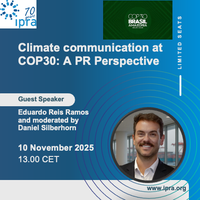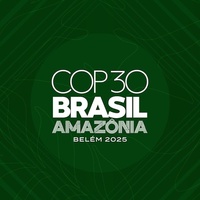
Climate Guidelines
IPRA Climate Change Communications Guidelines
Context to climate change
The science about climate change is unequivocal and attributable to human activity. Climate change is a threat to humanity and requires urgent action.
This crisis affects every country on every continent. It is disrupting national economies and affecting lives. Weather patterns are changing, sea levels are rising, and weather events are becoming extreme. Saving lives and livelihoods is key.
The Paris Agreement of 2015 aims to strengthen the global response to the threat of climate change by keeping a global temperature rise above pre-industrial levels of 1.5° Celsius by 2030. This includes a rapid reduction of greenhouse gas emissions to transition to a society of net-zero emissions.
Climate change is a priority for the United Nations. The UN agencies UNESCO and the World Meteorological Organisation are jointly responsible for climate knowledge and its promotion.
IPRA and climate change communications
IPRA’s consultative status with the United Nations connects us to the UN’s sustainable development goals (SDGs). We take our lead on climate change communication from SDG 13 to “take urgent action to combat climate change and its impacts”.
IPRA members have a responsibility to use their skills to improve public awareness of climate change and efforts to stop it. As David Attenborough said in 2020, “Saving the planet is now a communications issue.” Communicators play a pivotal role in the required transformation because they are the link between organisations and stakeholders.
According to a 2022 IPRA survey, climate change is a key PR topic. Most respondents, 81%, expect climate change to become increasingly important in their work over the next two years. Almost 90% believe that the PR profession has a responsibility to tackle climate change. Finally, PR professionals indicated that engaging with clients on climate action is a key responsibility. IPRA believes these results are a call to action to the communications profession. IPRA is uniquely positioned to make an impact worldwide and that is what we intend to do.
These guidelines take 7 of the 18 articles of the IPRA code of conduct and interpret implementation with respect to climate change communication. The implementations reference a PR practitioner’s personal, organizational, and societal responsibilities.
The IPRA Climate Change Guidelines
RECALLING the United Nations sustainable development goals and in particular goal 13 to “take urgent action to combat climate change and its impacts”;
RECALLING that public relations practitioners through their communication skills possess a unique means of influence;
RECALLING that public relations practitioners play a pivotal role to combat climate change because they are the link between organisations and stakeholders;
In the conduct of climate change communications public relations practitioners will implement:
- article two of the IPRA code to act with honesty and integrity by
- ensuring honesty in climate-related communications
- translating the science into communication that can be understood in the public arena
- article three of the IPRA code to establish the moral conditions for dialogue by
- fostering an internal culture in which colleagues feel safe to voice concerns
- partnering with external advocates of positive climate action
- promoting climate education in the professional and public arena
- article four of the IPRA code to be open and transparent by
- reporting on their own organization’s emissions and reductions pathway
- article five of the IPRA code to avoid professional conflicts by
- thoughtful consideration of work undertaken
- ensuring that work is in line with the UN’s sustainable development goals
- advising clients and management about societal expectations
- article seven of the IPRA code to ensure truth and accuracy by
- encouraging reference to science-based sources in line with the Intergovernmental Panel on Climate Change
- encouraging clients to reference sources contrary to the client’s position
- calling-out inaccurate communication in the public arena
- article eight of the IPRA code to not disseminate misleading information by
- preventing greenwashing in communication by referencing science-based data
- article ten of the IPRA code to not use organisations serving undisclosed interests by
- not using institutes that are funded by organisations which are significant contributors of emissions or that deny climate change.
Adopted January 2023
Translations
The IPRA Climate Change Communications Guidelines are available in a number of languages.
- Arabic
- Armenian
- Azerbaijani
- Asante Twi
- Bulgarian
- English
- Ewe
- Farsi
- Finnish
- French
- German
- Hausa
- Japanese
- Kurdish
- Ndebele
- Polish
- Russian
- Serbian
- Turkish
- Ukranian
The IPRA Climate Change Communications Guidelines are available in a number of languages.
Latest Ipra ITL:

ITL #651 Teaching public relations: young PR pros must inspire for good as they aspire for success

ITL #650 LinkedIn: why it’s non-negotiable for CEOs

ITL #649 Industry, HE and next gen communicators: deeper, more deliberate collaboration

ITL #648 When headlines lie, trust dies: why clickbait is PR’s next big battleground
Latest from the Press Room:
-

IPRA President Nataša Pavlović Bujas is made Woman.Comm PR Star and Special Star of the Year
-

Invitation to an IPRA webinar on Climate communication at COP30: A PR Perspective
-

What role does climate change communication play in your work?
-

Message from the IPRA President: Welcoming Esther Cobbah as 2026 IPRA President Elect. October 2025
